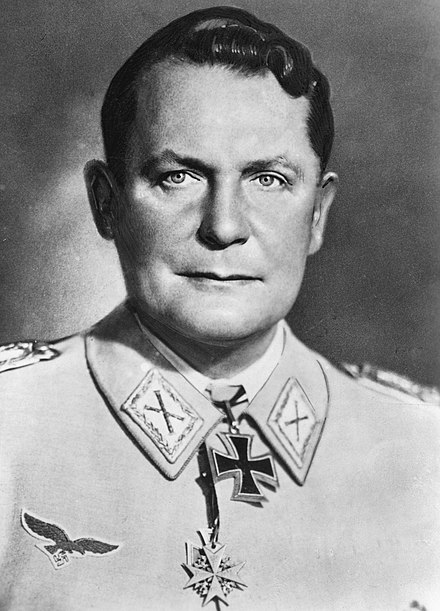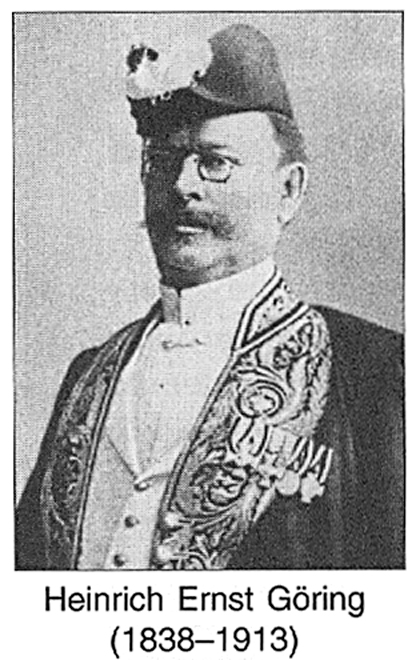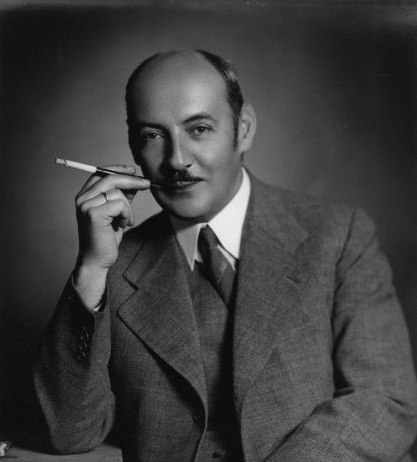 Hermann Goering (1893 - 1946)
“Hermann will be either a great man or a great criminal” - Fanny Goering
I: King of the Castle
Hermann Goering (1893 - 1946)
“Hermann will be either a great man or a great criminal” - Fanny Goering
I: King of the Castle
In much the same way as we tend to see King Henry VIII as a fat, corpulent, sullen figure in paintings while he was, in his prime, a fine figure of a man (well let’s be honest: even an ugly king is going to be doing very well to have eight separate wives, isn’t he?) our picture of Hermann Goring tends to be coloured by the fat, smirking and preening aristocratic officer World War II made him, and he often represents some of the worst excesses of the Reich, not in terms of genocide (though he surely had a hand in that too) but in terms of I suppose you might say decadence. On the face of it, Goring seems an unlikely fit for the Nazis, who had fooled themselves into believing they were the best of mankind, despite many physical and mental shortcomings. He was, for a start, the son of an aristocrat. Hitler hated the nobility from the beginning, seeing them as part of a corrupt and morally bankrupt system of class superiority that kept the working man down. He himself had no high breeding to speak of, nor indeed had his other henchmen, but Goring’s ancestry can be traced back to a hated tax collector appointed by the Prussian King in the seventeenth century, a reviled functionary of the monarchy whom Hitler would surely have despised as much as any Jew (or whom he may have inferred was of that hated race).

Heinrich Goering, his father, was the son of a judge, and had been the Reich Minister of Namibia, then called German West Africa, though his mother, Heinrich’s second wife, at least was a peasant, believed variously to have been a barmaid from Munich or a Bavarian peasant girl, twenty years younger than her husband. Hermann was her fourth child, second son, and he was born a large child at twelve pounds, but also a lonely one. Left in the care of his relatives while his mother went to join his father and the rest of their children in his new posting at Haiti, he became solitary and sullen, and fought when his mother returned after some years to take him from what he believed was, or had come to regard as his rightful and natural home. He developed an early interest in the military, and
'His childhood play was devoted almost exclusively to waging war, leading his small army of youngsters and toy cannons against imaginary enemies of Kaiser und Vaterland [Emperor and Fatherland]. If there was any question about his leadership ... he would bash their heads together and let them know" damn quick" who was boss. For, if his beautiful uniforms and his father's position of authority were not enough to establish [Hermann's] right of dominance over his companions, his ready use of force settled any doubts on that score”.

To his delight, his godfather (and lover to his mother) the family friend Dr. Hermann Epenstein (for whom it is speculated, though not confirmed, Goering was named) purchased an old German castle, Burg Veldenstein, and invited the Goerings to come live with him in a purpose-built house there, allowing young Hermann to live out the fantasy of being some baron or duke, and giving him the undeserved air of being an aristocrat. A lack of any sort of discipline in his formative years, from a mother who probably was more interested in carrying on with her lover and hoping not to be found out and a father whose health was deteriorating after so long spent in Africa and just wanted peace and quiet led to Hermann becoming a bully and full of himself. Sure he could do anything without any fear of reprisal, this must have prepared him well for the lavish lifestyle he would later lead while second-in-command to Hitler, and given him an overconfidence in his own abilities that nobody - then, or later - was willing or brave enough to dispute.

From an early age Hermann was indoctrinated with the hatred of Jews, even though Dr. Epensein, his godfather and quite possibly his actual father, was of Jewish descent. His time at public school was when this anti-semitism burgeoned and festered within him, to the point that he trained his dog to bark at anyone suspected of being Jewish. There was also a link in his own family tree, going back to the fifteenth century, which showed one of his ancestors had come from a Jewish family, a Swiss moneylender called Eberling, who had converted from Judaism to Christianity. The truth about his genealogy was brought home bitterly to him when he wrote an essay about someone he admired - Epenstein - and his headmaster took him to task angrily telling him no German boy should write favourably about a Jew! Whether Hermann had at that time any inkling as to the possibility of the doctor being his father is unknown, but the rebuke must have been a crushing blow to his almost hero-worship of, as it were, the man in the high castle. Worse was to come, when his faux pas was disseminated through the school and he had to wear a sign saying “My godfather is a Jew” for the day, getting beaten up by the older boys. It was the last day he spent at the school.
Unable to control him, unsure what to do with him, Hermann’s parents decided to enrol him in the Prussian Cadet Academy. As the boy had expressed a desire to be “a soldier, and nothing else” this seemed a satisfactory and equitable solution. In 1904 Hermann began his training, and took to the uniforms, drills, rigid unquestioning discipline and camaraderie like a duck to water. He did so well that five years later he was able to graduate to the senior academy with a commendation from his teachers, and totally immersed himself in military life, all but eschewing his own family for his new one, somewhat as the man who would one day be his glorious leader would do in the trenches of Flanders ten years later. For both men, the army (or in Hermann’s case, so far anyway the academy and later the air force) became their home, and neither wished for any other. Graduating among the top students, he was tipped for success in a military career, and his father, delighted at the change in the boy and in his achievements, sent him off to Italy on holiday, where he began his love affair with art, viewing all the Old Masters and taking in museums and galleries as he gloried in his new status.
On his return he found that things had soured between his father and their nominal landlord, Epenstein angered at Heinrich Goering’s accusations (all true, so it would seem) of his infidelity with his wife. Having already moved on to a twenty-something new mistress and no longer bothered with Fanny (or perhaps we should waggishly say, bothered with another fanny!) the doctor left Veldenstein and, without his financial support, the Goerings were unable to stay there, and moved into an apartment in Munich. In 1913 Heinrich died and a year later, just as Adolf Hitler was enlisting as a dispatch runner, World War I about to break over Europe, Hermann signed up for the infantry.

Here he met a man who was to become his lifelong friend and help inspire an interest in flying which would stay with him for the rest of his life. Bruno Loerzer had been accepted into the flying corps and whether it was revisionist history or wishful thinking, Goering mentions the circumstances of his friend’s attraction to and induction into the flying corps as similar to his own; in fact, he may have been using this to mythologise himself later on, as Hitler and his biographers would. When the war began, Goering was still in the infantry and acquitted himself well, emulating his future fuhrer and earning himself the distinction of being awarded the Iron Cross Second Class. However, less than two months into the war he was stricken with a severe bout of rheumatoid arthritis and had to be invalided out.